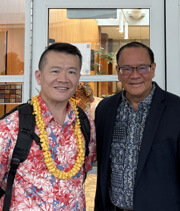Strengthening Pacific Connections Through Culture and Youth Leadership
by OHA Trustee Keli‘i Akina, Ka Wai Ola, October 1, 2025
Recently, I had the privilege of welcoming the Ministry of Foreign Affairs of Taiwan and their delegation of International Youth Ambassadors to OHA alongside Trustee Dan Ahuna.
In my opening remarks, I mentioned some of the common values shared by the Chinese and Hawaiian people, chief of which is the virtue of benevolence and love for humanity. In China, they call it ren’ai. Here in Hawaiʻi Nei we call it aloha.
The visit was more than a diplomatic courtesy – it was an opportunity to exchange cultural values, build friendships across the Pacific, and highlight the enduring importance of Indigenous identity in a rapidly evolving world. The International Youth Ambassadors, comprised of 40 outstanding Taiwanese university students, were eager to engage with our work at the Office of Hawaiian Affairs and to learn how Native Hawaiian traditions and values continue to shape community wellbeing today.

Ministry of Foreign Affairs Deputy Director General Mr. Chia-Chi Kang and Trustee Akina at Nā Lama Kukui on August 21, 2025. – Courtesy Photo
Their time at OHA emphasized that Indigenous heritage is not only about the past, but about guiding principles for the future. As part of the exchange, we shared stories about Native Hawaiian resilience, language revitalization, and the ongoing efforts to restore balance between community, land, and governance.
William Lee, one of the International Youth Ambassadors told the gathering, “It’s a true honor for us to be here today. As youth ambassadors from ROC Taiwan, we are inspired by OHA’s mission to advance the wellbeing of Native Hawaiians through ʻohana, moʻomeheu, and ʻāina. These principles resonate strongly with our own efforts to preserve Indigenous heritage, revitalize languages, and uplift communities.” He continued, “Hawaiʻi and Taiwan share Austronesian cultural roots, reminding us that across the Pacific our peoples are linked by history and spirit. We admire how OHA integrates culture into education, health, housing, and economic stability. Taiwan also invests in similar areas, striving to protect traditions while improving the lives of our Indigenous people.”
A key theme that emerged during the visit was the role of Indigenous knowledge in higher education. Students shared how exposure to cultural teachings has not only broadened their perspectives but also deepened their understanding of how traditional wisdom can coexist with modern scholarship.
The youth ambassadors reflected on the importance of blending cultural wisdom with academic knowledge, emphasizing that education should not separate tradition from innovation. “We need to figure out how to work together, bringing Indigenous science and Western science together,” shared Abus Istasipal, another International Youth Ambassador. This call for collaboration highlights how Indigenous perspectives can complement modern research and create more holistic approaches to solving global challenges.
Trustee Ahuna and I both expressed our hope that these exchanges continue to grow. For Native Hawaiians, the Pacific is our ancestral highway – a pathway of connection, not separation. Welcoming the youth ambassadors reminded us that the challenges we face, from migration to cultural preservation, require shared commitment and mutual respect.
As these young ambassadors return home, they carry with them not only memories of Hawaiʻi but also the responsibility to strengthen cultural ties in their own communities. For OHA, we are inspired to continue creating spaces where Indigenous values can resonate globally.